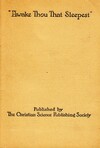

Are you sure?
This bookmark will be removed from all folders and any saved notes will be permanently removed.
The senses and sleep
Originally published in March 14, 1917 issue of The Christian Science Monitor
When Paul, writing to the Galatian church, declared that the Spirit lusted against the flesh and the flesh against the Spirit, he referred, of course, to the perpetual effort of the material senses to drown any spark of spiritual perception in a sea of materiality. When, writing to the Romans, he declared the evil that he would not that he did, and the good he would he did not, he laid emphasis again on the same fact, and when later, in the same letter, he demanded who would deliver him from the body of this death; he connected the entire belief of birth and death, of material existence, that is to say, with the effort to submerge the spiritual instinct in this sea of materiality, thus, through the very apathy to Truth engendered by sensuality, bringing about the inevitable material incident known as death.
So long, consequently, as the human being remains awake to the demands of Spirit, he remains more or less impervious to the suggestions which ultimate in sin, disease, and death. But it is just here that the lusting after apathy, produced by the perpetual lusting of the flesh against the Spirit, wears down, so constantly, the effort of the human being to, as Mrs. Eddy writes, on page 392 of Science and Health, "Stand porter at the door of thought." What inevitably follows is the apparent victory, for the moment, and in the particular instance, of the flesh over the Spirit. The human being lapses from spiritual consciousness into material unconsciousness, since every mental state in which Spirit is not predominant is, to that extent, unconsciousness. ''The parent of all human discord", Mrs. Eddy writes, beginning on page 306 of Science and Health, "was the Adam-dream, the deep sleep, in which originated the delusion that life and intelligence proceeded from and passed into matter."
Now all apathy is part of the Adam-dream. It is all a phase of the dominant sensuousness of the human mind, which takes refuge, from the insistent demands of Spirit, in the mental inertia which is itself only a form of the Adam sleep, and which always finds for the victim an excuse for yielding to it, by arguing to him that he must rest periodically, from the demands of Spirit, by yielding, in the sweet reasonableness of common sense, to the demands of the body. To the man in the street the argument is a perfectly sound one. He admits the reality of matter, he acknowledges the validity of physical law, and therefore in bowing to what he imagines are the demands of the body, he shows at once, to his own satisfaction at any rate, his common sense and his scientific acquaintance with law. In the case of the Christian Scientist this is different. He denies the reality of matter, and insists that the only reality is the divine Mind, and, therefore, he is in a position to demonstrate the saying of Mrs. Eddy, on pages 519 and 520 of Science and Health, that "The highest and sweetest rest, even from a human standpoint, is in holy work."
Enjoy 1 free Sentinel article or audio program each month, including content from 1898 to today.
JSH Collections
This article is included in:
1917 - PAMPHLET
Awake thou that sleepest
JSH-Online has hundreds of pamphlets, anthologies, and special editions for you to discover.


